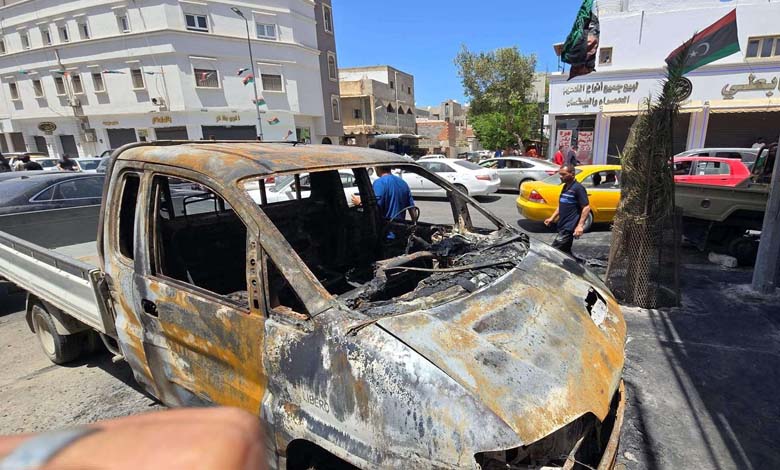Militia Arms Chaos Reignites Violence Spiral in Tripoli

Sources confirmed that new clashes erupted between the 444th Brigade led by Mahmoud Hamza and the Special Deterrence Force commanded by Abdelraouf Kara, headquartered at the Mitiga airbase.
Fighting resumed early Wednesday between armed groups in various parts of the Libyan capital, Tripoli, just one day after the death of Abdelghani Al-Kikli, known as Ghnaiwa, commander of the Stabilization Support Apparatus under the Presidential Council, and the collapse of his forces in confrontation with units affiliated with the Government of National Unity (GNU). The incident underscores the growing threat militias pose to the future of Libyans.
-
Violent Clashes Between Major Factions Threaten Stability in the Libyan Capital
-
Libyan candidates talk and militias mobilize as electoral process collapse
Eyewitnesses reported that clashes flared up again in the neighborhoods of Ain Zara, Ras Hassan, and Bin Ashour in Tripoli.
According to “Al-Wasat Gate,” the clashes involved the 444th Combat Brigade of the interim GNU, led by Mahmoud Hamza, and the Special Deterrence Force under Abdelraouf Kara, based at Mitiga Airbase.
Reports indicate that fighting spread along the edges of Tripoli — from the eastern entrance in the Saba’a area to the western gate in the Tourist District, as well as south to Ain Zara. Sources also reported an advance by the Deterrence Force after the retreat of the 444th Brigade, alongside reports of the withdrawal of forces arriving from the city of Misrata.
-
Is the change in the Libyan political scene capable of lifting Turkish supervision, or will they increase their consolidation ?
-
Weapon Chaos in Libya: Zawiya under the Grip of the Al-Farr and Al-Qasab Conflict
Earlier information indicated that the 444th Brigade had seized positions held by the Deterrence Force in Ain Zara, but the latter regained full control in a counterattack and pursued the withdrawing units.
The 444th Brigade also participated in the assault on the positions and barracks of the Stabilization Support Apparatus led by Ghnaiwa, suggesting Prime Minister Abdelhamid Dbeibah’s intent to pursue a military solution in a broader power struggle. It was seen as a show of strength, sending a clear message both domestically and internationally that he remains a central figure in the Libyan equation, especially in the western region.
Libyan media reported that flights at Tripoli’s Mitiga International Airport were suspended due to the fighting. Meanwhile, the Libyan Red Crescent raised the alert level in Tripoli to the highest degree, and the University of Tripoli suspended classes again.
-
Dbeibeh Seeks to Bolster Domestic Support with a Firm Stance against Migrant Resettlement
-
Libya’s Muslim Brotherhood Incites Armed Resistance Against Peaceful Solutions
The Judicial Police Agency also announced Wednesday that several prisoners had escaped from Al-Jadida Prison in Tripoli amid intense fighting. In a statement, it explained that renewed clashes around the prison caused panic among inmates, leading to a mass escape — most of whom were serving heavy sentences for serious criminal cases. The agency warned that continued fighting would result in “grave and catastrophic consequences” for the security and stability of Tripoli.
The Ministry of Education in the GNU also announced the suspension of classes due to the clashes in the capital.
The Coordination of Political Parties issued a statement condemning the violence and warning of the dangers posed by uncontrolled armed groups.
-
Is Libya Becoming a Hub for Exporting Armed Militias to Africa?
-
Clashes Between Militias in Tripoli Mar Eid Atmosphere
It stated: “The clashes taking place in Tripoli cannot be separated from their economic dimensions,” adding that indicators point to an intense struggle for resources and financial control, which has led to the erosion of state institutions, rising social imbalances, visible economic disparities, and increasing poverty rates.
The statement called for the removal of armed groups from cities and demanded “a full commitment to de-escalation, a halt to armed clashes, and refraining from the use of force — especially in residential areas — due to the damage inflicted on civilians in terms of lives and property.”
On Monday evening, Tripoli had already witnessed armed clashes in the Salah al-Din and Abu Salim districts, amid reports of Ghnaiwa’s death, according to Libyan media.
-
Complications Hindering the Evacuation of Militias from Tripoli
-
Tripoli Ignites: How Did Hamza’s Arrest Lead to a War Between the “Deterrence” and “Brigade 444”?
Libya continues to suffer from intermittent security crises amid a persistent political divide since 2022, with two rival governments: one, the UN-recognized GNU headed by Abdelhamid Dbeibah based in Tripoli and controlling the west; the other, headed by Osama Hamad, appointed by the House of Representatives and based in Benghazi, administering the east and parts of the south.
For years, UN-led efforts to hold parliamentary and presidential elections have faltered, as Libyans hope for a transition to a unified government and an end to the years-long armed conflict in their oil-rich country.












